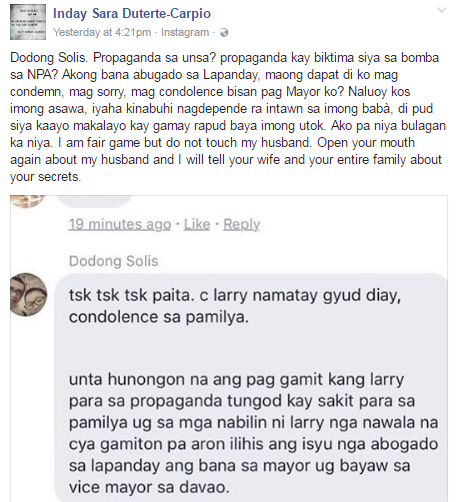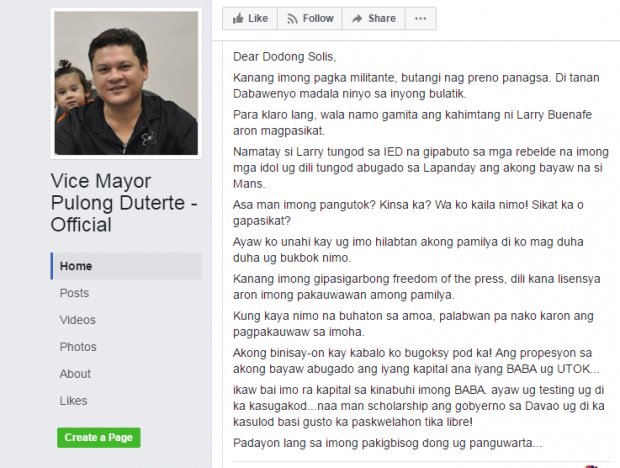REGRETTABLY, the conversation between President-elect Rodrigo Duterte and the news media has turned sharp and shrill. All but lost in the noise is the two parties’ common duty in law and tradition to serve and to inform the Filipino people on issues, events and policies that affect their interest and welfare.
A president—all at once the chief executive, fount of foreign policy, manager of the national household, guardian of peace and order, commander of the uniformed services, and arbiter of policy conflicts—is the most important pivot of news and policy in the land. A president is mandated by law to lead the nation and to promote transparency, accountability and good governance.
But the Constitution also upholds the citizens’ rights to free speech, free press, free expression, and peaceable assembly. It guarantees as well their right to due process, equality before the law, access to information, justice, and life.
As “the people’s private eye in the public arena,” the news media serve as custodian and gatekeeper of some of these rights. It’s a task that must be accomplished, and the President-elect’s predecessors as well as the nation’s journey from democracy to dictatorship and back illustrate why and how we must inquire into, inveigh against, and investigate questionable public officials and agencies, on the citizens’ behalf.
Thus, despite his vexation with those he calls the “lowlifes” and the “mouthpieces” in the news media, we must at all times cover him, his actions, and his statements. In truth, the news media must report more—and better—about him, his policies and his actions, with our reports guided by the best standards of accuracy, fairness and context.
This we must do even as we note at least two disturbing “messages” from the President-elect.
First, by saying that “corrupt journalists … vultures of journalism can die for all I care [because] you’re asking for it,” he mocks the memory of 172 journalists (at latest count) killed in the line of duty since democracy’s rebirth in 1986. The last reports filed by a majority of those slain journalists precisely exposed crime and corruption, the same social ills that he says he wants to curb. Sadly, not a single mastermind or principal suspect in these murders, including state agents, local warlords, and criminal elements, have been held to account.
Second, whether intended or not, his volcanic language has dampened, indeed chilled, the daily reportage, so that journalists with valid, if testy, questions are seemingly forced to eat expletives by way of a response.
To be sure, corruption in the news media is as real as the 16-million vote that secured the victory of the President-elect. To be sure, corruption afflicts both individuals and agencies in the news media, and has evolved into a subculture with a language all its own.
As anywhere else, however, corruption in the news media is a supply-demand chain. One solution offers a key role for the incoming administration: Slay it at the source. The government’s own media agents, as well as politicians and corporate PRs who offer more than stories to get favorable coverage or to spike bad news, must, in the President-elect’s words, “stop it.” Another solution calls for quick action from media managers: Provide better pay and protection for journalists.
But here’s the thing: The institutional capture of the news media by politicians has begun in some parts of the country. Local politicians and their families have acquired ownership and control of print and broadcast media agencies, and certain local government units have bought block-time segments using public funds. The corruption of the news media thus also involves partisan political interests driving editorial processes—as the President-elect knows full well.
Yet for all the supposed differences, the news media and the President-elect have complete agreement on one factor: the urgency of a Freedom of Information Law. The issuance of an FOI executive order on Day One of his presidency should prevent the 17th Congress from tarrying in its task.
An FOI Law will provide the necessary institutional and legal framework for full and true functional links between transparency and accountability in government, and for the right of all Filipinos to access information in order to take part in nation-building.
We in the news media wish the incoming administration success in all its endeavors. As journalists and as citizens, we commit not only to do journalism right and better, but also to uphold and defend free speech, free press, free expression, and the people’s right to know. #
=====
List of media organizations and outfits that published this editorial:
Philippine Press Institute (PPI)
National Union of Journalists of the Philippines (NUJP)
Philippine Daily Inquirer
Philippine Star
Philippine Center for Investigative Journalism (PCIJ)
Notre Dame Broadcasting Corporation (NDBC)
Mindanao Cross
Mindanao Gold Star Daily
Sun.Star-Cagayan de Oro
The Journal
The Freeman
Bicol Today
College Editors Guild of the Philippines
Kodao Productions
Bulatlat
Philippine Collegian
Eastern Vista
Pahayagang Balikas
Banat News
Northern Dispatch
Panguil Bay Monitor
Mindanao Monitor
Catarman Weekly Tribune
The Standard
Lanao del Norte Today
Panguil Bay Monitor
Mindanao Monitor
Eastern Vista
Panay Today
The Manila Standard


